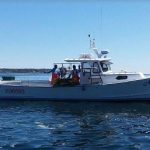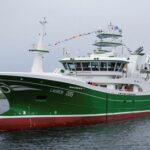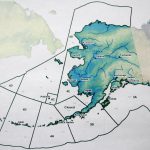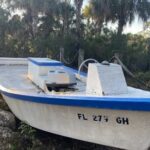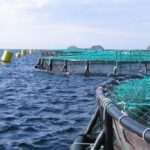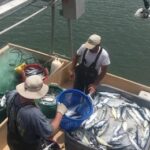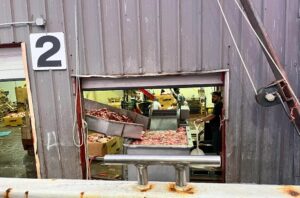Tag Archives: gulf-of-maine-cod
Could This Be the End for Gulf of Maine Cod?
New England’s cod fishermen are struggling with drastically reduced catch allowances. A new report says the fish are disappearing anyway. <Read more here> 21:50
Decline of Gulf of Maine cod leaves regulators a tough task
 The Gulf of Maine cod population has continued to drop despite decades of catch restrictions, according to preliminary results of a new National Oceanic and Atmospheric Administration study. Exact causes are unknown, but they likely include warming of the oceans and continued overfishing, marine scientists said. <Read more here> 08:11
The Gulf of Maine cod population has continued to drop despite decades of catch restrictions, according to preliminary results of a new National Oceanic and Atmospheric Administration study. Exact causes are unknown, but they likely include warming of the oceans and continued overfishing, marine scientists said. <Read more here> 08:11
NEFMC Executive Director Tom Nies warns of deeper cod cuts if NOAA data holds
![]() The New England Fisheries Management Council expects to move to reduce the annual catch limit for Gulf of Maine cod in 2015 if an impending peer review process shows the dire conclusions of recently completed, if are accurate. “This is BS,” Vito Giacalone, the policy director for the Northeast Seafood Coalition, told the members of the NEFMC’s groundfish committee at the DoubleTree Hotel. “This is not the way it’s supposed to work.” <Read more here> (no need for 2nd page view) 22:29
The New England Fisheries Management Council expects to move to reduce the annual catch limit for Gulf of Maine cod in 2015 if an impending peer review process shows the dire conclusions of recently completed, if are accurate. “This is BS,” Vito Giacalone, the policy director for the Northeast Seafood Coalition, told the members of the NEFMC’s groundfish committee at the DoubleTree Hotel. “This is not the way it’s supposed to work.” <Read more here> (no need for 2nd page view) 22:29
2 for the Price of One from El Globo! Gulf of Maine’s cod stock falling, study says – Gulf of Maine Cod Stock at All-Time Low
The cod population in the Gulf of Maine is plummeting more steeply than previously thought, according a new assessment by the federal agency that monitors the fishing industry. Underwater surveys conducted by the National Oceanic and Atmospheric Administration estimated that the iconic species has dwindled to as little as 3 percent of what it would take to sustain a healthy population. Read more here Gulf of Maine Cod Stock at All-Time Low Read more here 16:15
Trip Limit Adjustments in New England Groundfish Fishery
 NMFS announced temporary measures to increase the possession limits for Gulf of Maine cod, Cape Cod/Gulf of Maine yellowtail flounder, Gulf of Maine winter flounder, white hake, and pollock for Northeast multispecies common pool vessels for the remainder of the 2013 fishing year. This action is being taken because catch rates of these stocks are low. Increasing these possession limits is intended to provide additional fishing opportunities and help allow the common pool fishery to catch more of its quota for these stocks. Click here to read more 09:36
NMFS announced temporary measures to increase the possession limits for Gulf of Maine cod, Cape Cod/Gulf of Maine yellowtail flounder, Gulf of Maine winter flounder, white hake, and pollock for Northeast multispecies common pool vessels for the remainder of the 2013 fishing year. This action is being taken because catch rates of these stocks are low. Increasing these possession limits is intended to provide additional fishing opportunities and help allow the common pool fishery to catch more of its quota for these stocks. Click here to read more 09:36
Poor counting plagues New England fisheries – Federal scientists acknowledge problems but make excuses
“I think it’s irresponsible to shut down fisheries based on such inaccurate stock assessments,” said Steve Cadrin, a former federal stock assessment scientist and a professor at the University of Massachusetts-Dartmouth.
Federal scientists acknowledge errors in assessments of critical New England fish stocks and say they’re working hard to fix them. But they add that their overall methods are proven sound. continued@morningsentinal
Which is Bull Bleep! Read this article.
Because New England has one of the longest-running fishery databases in the world, computer modeling had a good track record of predicting future species populations. Federal fisheries law is built on those predictions, and is based on limiting catches when fish stocks decline below a specific population size.
But that model assumes that the ocean environment is relatively stable and that the amount fishermen catch is the biggest variable that must be brought under control. It worked well enough until the ocean began showing signs it was changing, said Steve Cadrin, an associate professor at University of Massachusetts Dartmouth School for Marine Science and Technology and a former NMFS fisheries scientist.
Excellent Article: Fishing the Gulf of Maine: Tradition at a Crossroads By Michael Sanders
When most of us go down to the coast, whether to walk or swim or fish or sail, we take for granted what we see before us. We see the lobster boats and the colorful buoys marking the strings of traps, the bobbing green and red cans marking safe passage, the gulls and other seabirds. In the larger working harbors like Portland and Stonington and Port Clyde, there might be draggers tied up, unloading fish they’ve caught far out in the Gulf of Maine and on Georges Bank. What we don’t realize,,,,,,,,continued
In depth article: Climate Change Impacts Ripple Through Fishing Industry While Ocean Science Lags Behind
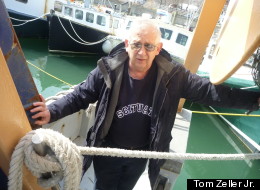 Huffington Post – With a limberness that defies his 69 years, Frank Mirarchi heaves himself over the edge of a concrete wharf and steps out onto a slack, downward sloping dock line bouncing 20 feet above the lapping waters near Scituate, Mass. continued
Huffington Post – With a limberness that defies his 69 years, Frank Mirarchi heaves himself over the edge of a concrete wharf and steps out onto a slack, downward sloping dock line bouncing 20 feet above the lapping waters near Scituate, Mass. continued
NOAA Responds to Massachusetts legislators on cod, haddock, and yellowtail flounder: the answer is still no
Many legal observers, Members of Congress and elected officials disagree with that interpretation. Saving Seafood requested the legal opinion of the General Counsel under the Freedom of Information Act. The Department found 2![]() 9 pages of written material constituting the advice, but refused to release any of them under 5 U.S.C. § 552(b)(5), which exempts from disclosure inter-agency or intra-agency memorandums or letters that would not be available by law to a party other than an agency in litigation with the agency. Saving Seafood continues to ask the agency to explain their legal rationale in the face of such widespread disagreement from numerous legislators and lawyers with qualifications to comment. continued
9 pages of written material constituting the advice, but refused to release any of them under 5 U.S.C. § 552(b)(5), which exempts from disclosure inter-agency or intra-agency memorandums or letters that would not be available by law to a party other than an agency in litigation with the agency. Saving Seafood continues to ask the agency to explain their legal rationale in the face of such widespread disagreement from numerous legislators and lawyers with qualifications to comment. continued
As grim fishing year approaches, New England’s fishing fleet tries to deal with new catch limits – “What are people doing to help the industry?”
![]() BOSTON – Deep cuts in catch limits will hit New England’s fishing fleet in less than three weeks, and there’s little hint any real relief is coming. But regulators and fishermen are still seeking ways to lessen a blow fishermen warn will finish them off. As time grows short, Gloucester’s Al Cottone said he and his fellow fishermen seem to be facing the future in a sort of “state of shock.” “Everyone’s in denial. They still think, you know, someone’s going to come in on their white horse and save us,” he said. “No one knows what they’re going to do,” he said. “Nobody.” continued
BOSTON – Deep cuts in catch limits will hit New England’s fishing fleet in less than three weeks, and there’s little hint any real relief is coming. But regulators and fishermen are still seeking ways to lessen a blow fishermen warn will finish them off. As time grows short, Gloucester’s Al Cottone said he and his fellow fishermen seem to be facing the future in a sort of “state of shock.” “Everyone’s in denial. They still think, you know, someone’s going to come in on their white horse and save us,” he said. “No one knows what they’re going to do,” he said. “Nobody.” continued
Lawmakers push to ease fish limits
![]() Citing widespread evidence of an abundance of important commercial in shore fish stocks — and a scientific study that found flaws in the modeling methods used by the government to set catch limits — a contingent of state lawmakers led by Senate President Therese Murray is urging NOAA’s top fisheries official to delay dire cuts planned for May 1 and allow the fleet reasonable access to stocks while new studies are conducted into the vitality of the Gulf of Maine ecosystem. continued
Citing widespread evidence of an abundance of important commercial in shore fish stocks — and a scientific study that found flaws in the modeling methods used by the government to set catch limits — a contingent of state lawmakers led by Senate President Therese Murray is urging NOAA’s top fisheries official to delay dire cuts planned for May 1 and allow the fleet reasonable access to stocks while new studies are conducted into the vitality of the Gulf of Maine ecosystem. continued
Massachusetts Lawmakers press NOAA to ‘suspend’ May 1 quota cuts
![]() Citing widespread evidence of an abundance of important commercial in shore fish stocks and a scientific study that found flaws in the modeling methods used by the government to set catch limits, a contingent of state lawmakers led by Senate President Therese Murray are urging NOAA’s top fisheries official to allow the fleet reasonable access to stocks while new studies are conducted into the vitality of the Gulf of Maine ecosystem. continued
Citing widespread evidence of an abundance of important commercial in shore fish stocks and a scientific study that found flaws in the modeling methods used by the government to set catch limits, a contingent of state lawmakers led by Senate President Therese Murray are urging NOAA’s top fisheries official to allow the fleet reasonable access to stocks while new studies are conducted into the vitality of the Gulf of Maine ecosystem. continued
Editorial: Influx of cod must spark feds to delay limit cuts
![]() But the influx of cod must be seen as bad news by those esteemed NOAA “scientists” and officials who, with the help of their closely-related environmental nonprofit spin doctors, have poured countless PR dollars and effort into spreading the false word that, indeed, the cod stocks are so diminished — especially from the Gulf of Maine — that we need to cut those fishermen’s 2013 quota by a job- and industry-killing 77 percent. continue reading
But the influx of cod must be seen as bad news by those esteemed NOAA “scientists” and officials who, with the help of their closely-related environmental nonprofit spin doctors, have poured countless PR dollars and effort into spreading the false word that, indeed, the cod stocks are so diminished — especially from the Gulf of Maine — that we need to cut those fishermen’s 2013 quota by a job- and industry-killing 77 percent. continue reading
Comeback for cod, yellowtail? Gulf of Maine cod have made a dramatic return
![]() In a welcome surprise but one with potentially complex implications, Gulf of Maine cod have returned in notable concentrations to Stellwagen Bank and are being landed with plentiful yellowtail flounder by the inshore fleet. continue
In a welcome surprise but one with potentially complex implications, Gulf of Maine cod have returned in notable concentrations to Stellwagen Bank and are being landed with plentiful yellowtail flounder by the inshore fleet. continue
Catch shares tied to cod losses – State fisheries chief cites lack of controls under NOAA system
![]() The 2010 catch share commodification of the Northeast groundfishery, hailed by advocates including NOAA Administrator Jane Lubchenco as a sure path to restoring overfished stocks and profitability for the fleet, has had the opposite effect on Gulf of Maine cod, according to the state’s director of marine fisheries.
The 2010 catch share commodification of the Northeast groundfishery, hailed by advocates including NOAA Administrator Jane Lubchenco as a sure path to restoring overfished stocks and profitability for the fleet, has had the opposite effect on Gulf of Maine cod, according to the state’s director of marine fisheries.
The habit of bigger offshore boats to accumulate catch shares in Gulf of Maine cod and capitalize on pulses of the cod with landings far larger than 800 pounds has “significantly contributed to declines in local abundance” of the essential fish for the day boats, state fisheries chief Paul Diodati said in a memo sent Feb. 5 to the Marine Fisheries Advisory Commission and obtained by the Times. Read more here
NOAA shielding key legal document – “That information is attorney-client privileged!” Ciaran Clayton, NOAA’s director of communications
![]() The legal document underpinning the decision of NOAA’s regional administrator against easing the 77 percent cod limit cuts seen as a death knell for the industry starting May 1 will not be shared with the public, the agency has advised the Times. According to NOAA officials, the office of NOAA General Counsel Lois Schiffer submitted a legal brief to Gloucester-based Northeast Regional Administrator John Bullard last month that gave the legal reasoning behind his decision against allowing the Northeast groundfishery, declared a disaster in September by the acting commerce secretary, to be allowed a second year of interim emergency relief from extreme cutbacks in Gulf of Maine cod. Read more
The legal document underpinning the decision of NOAA’s regional administrator against easing the 77 percent cod limit cuts seen as a death knell for the industry starting May 1 will not be shared with the public, the agency has advised the Times. According to NOAA officials, the office of NOAA General Counsel Lois Schiffer submitted a legal brief to Gloucester-based Northeast Regional Administrator John Bullard last month that gave the legal reasoning behind his decision against allowing the Northeast groundfishery, declared a disaster in September by the acting commerce secretary, to be allowed a second year of interim emergency relief from extreme cutbacks in Gulf of Maine cod. Read more
John Bullard – No guarantees that fish stocks will come back
The big question is: Why has this happened? Over the years, quotas have been gradually reduced, but still the fish aren’t coming back as expected. It isn’t simply a case of overfishing. There are environmental forces at play such as![]() predation from recovered populations of dogfish and seals, changes in ocean water temperature and increases in ocean acidity. So, while it may not be totally on the fishermen’s shoulders, it will be the fishermen who will have to pay the price. Read more
predation from recovered populations of dogfish and seals, changes in ocean water temperature and increases in ocean acidity. So, while it may not be totally on the fishermen’s shoulders, it will be the fishermen who will have to pay the price. Read more
Editorial: Rollover quota spotlights absurd 2013 cod cuts
 Bullard’s own interpretation — backed by NOAA’s general counsel, Lois Schiffer, and her shady law enforcement gang — of the Magnuson-Steven Act, which suggests he had no option to extend the current year’s 22-pecent interim cut for a second year. That stand is widely refuted by the Gloucester-based Northeast Seafood Coalition, and by several members of Congress, which put the Magnuson-Stevens’ mandates in place and urged Bullard to reconsider. Read more
Bullard’s own interpretation — backed by NOAA’s general counsel, Lois Schiffer, and her shady law enforcement gang — of the Magnuson-Steven Act, which suggests he had no option to extend the current year’s 22-pecent interim cut for a second year. That stand is widely refuted by the Gloucester-based Northeast Seafood Coalition, and by several members of Congress, which put the Magnuson-Stevens’ mandates in place and urged Bullard to reconsider. Read more
NOAA – Effective Today Trip Limit Adjustments for Groundfish Common Pool Vessels
NOAA Fisheries today announced that effective immediately trip limits for Gulf of Maine cod, Georges Bank cod and Southern New England/Mid-Atlantic yellowtail flounder are increased for common pool vessels fishing under a Northeast multispecies day-at-sea. Also effective immediately, the trip limits for white hake and pollock are decreased for common pool vessels. Proportional trip limit adjustments also have been made for the Handgear B permit for Gulf of Maine and Georges Bank cod, as required by the regulations. These measures remain in effect through the end of the current fishing year, which ends on April 30, 2013. Read the Bulletin here
New England – Drastic Cuts to Imperiled Cod Fishery
 Rip Cunningham, chairman of the New England Council, told the Gazette this week it was a difficult process. “I continue to think it was a tough decision to make,” he said. “Given the circumstances, I think the council made the right decision. The council understands that when they make their decision there are real people that are going to be impacted. I certainly hope everyone is thinking that we have to do a balance between mitigating short-term impacts to the fishermen and the long-term impacts to the resource.” Read more here
Rip Cunningham, chairman of the New England Council, told the Gazette this week it was a difficult process. “I continue to think it was a tough decision to make,” he said. “Given the circumstances, I think the council made the right decision. The council understands that when they make their decision there are real people that are going to be impacted. I certainly hope everyone is thinking that we have to do a balance between mitigating short-term impacts to the fishermen and the long-term impacts to the resource.” Read more here
Voices of the exterminators and the exterminated .The New England Ground Fish Fleet
Just three years ago, the industry was told that the Gulf of Maine cod stock was rebounding and was expected to be fully rebuilt by 2014. The following year, they were told the models had been wrong and the stock was actually appro aching
aching
depletion. Fishermen continued to express concern with the science behind the stock assessments on Wednesday. “We’re not talking about, ‘Oh yeah, we’re going to have a tough year next year,’” “We’re talking about, you know, that’s it.’”David Goethel. Read more here
Our view: Bay State’s ‘Sacred Cod’ has become NOAA’s sacred cow
 Yes, NOAA can show “scientific” data suggesting that these dire cuts — up to 77 percent for the Gulf of Maine cod catch — may be necessary. Yet NOAA also had 2008 survey data that showed many of the cod stocks were already rebuilt. And NOAA’s latest data is off an assessment model that did not include any input from fishermen, meaning it’s no more credible than the admittedly bogus data used in the “Trawlgate” fiasco of 1999-2000, when NOAA conceded its statistics were hopelessly flawed, yet still used them to set stock limits. Read more here
Yes, NOAA can show “scientific” data suggesting that these dire cuts — up to 77 percent for the Gulf of Maine cod catch — may be necessary. Yet NOAA also had 2008 survey data that showed many of the cod stocks were already rebuilt. And NOAA’s latest data is off an assessment model that did not include any input from fishermen, meaning it’s no more credible than the admittedly bogus data used in the “Trawlgate” fiasco of 1999-2000, when NOAA conceded its statistics were hopelessly flawed, yet still used them to set stock limits. Read more here
One fisherman’s tale shows plight of many -Richard Gaines – gloucester daily times
For a gillnet fisherman, these are trying times — with worse yet to come. Captain Don Smith, a 57-year-old transplanted Mainer whose family roots are in Nova Scotia and has fished commercially from Gloucester for more than 30 y ears, doesn’t need to be prodded to speak to that…… Making life more difficult for the small boats are the big boats; these “trip” boats that traditionally worked offshore on the more distant Georges Bank. But the catch share trading system imposed by federal regulators in 2010 has liberated them to acquire quota from non-participants or day boats, and — no longer limited by daily catch limits —they have been induced to chase the pulses of cod onto Stellwagen, where they flaunt their scale and have their way. Read more here
ears, doesn’t need to be prodded to speak to that…… Making life more difficult for the small boats are the big boats; these “trip” boats that traditionally worked offshore on the more distant Georges Bank. But the catch share trading system imposed by federal regulators in 2010 has liberated them to acquire quota from non-participants or day boats, and — no longer limited by daily catch limits —they have been induced to chase the pulses of cod onto Stellwagen, where they flaunt their scale and have their way. Read more here
On the brink: New fishing restrictions — Frustration, anger and perhaps end of an industry –
![]() John Bullard, regional administrator of the National Marine Fisheries Service and the National Oceanic and Atmospheric Administration, said an interim measure is only an allusion.“Fisherman don’t need allusions,” Bullard said. “They need a big dose of reality.” The interim action kept the fishery in business while addressing fish stock assessment numbers that were much lower than initially reported. Goethel said that discrepancy in stock assessment needs examination.“There should have been a real serious examination from outside the organization, not just from within,” he said. “We have to start looking for other underlying causes to this problem.” Read more here
John Bullard, regional administrator of the National Marine Fisheries Service and the National Oceanic and Atmospheric Administration, said an interim measure is only an allusion.“Fisherman don’t need allusions,” Bullard said. “They need a big dose of reality.” The interim action kept the fishery in business while addressing fish stock assessment numbers that were much lower than initially reported. Goethel said that discrepancy in stock assessment needs examination.“There should have been a real serious examination from outside the organization, not just from within,” he said. “We have to start looking for other underlying causes to this problem.” Read more here
Fishermen saw cuts coming
 When previous catch reductions have been rolled out by the New England Fishery Management Council, fishermen have reacted with some degree of anger. This time, though, the council’s announcement of a stiff drop in the allowable catch of cod and other groundfish has been met by many on the Cape with something else: resignation. Fisherman Greg Walinski of Dennisport was one who saw this coming, but he said there’s more to the problem than just overfishing. Read more
When previous catch reductions have been rolled out by the New England Fishery Management Council, fishermen have reacted with some degree of anger. This time, though, the council’s announcement of a stiff drop in the allowable catch of cod and other groundfish has been met by many on the Cape with something else: resignation. Fisherman Greg Walinski of Dennisport was one who saw this coming, but he said there’s more to the problem than just overfishing. Read more
‘The fish aren’t there’? Industry isn’t buying it
 But the fishing community continues to disbelieve the National Marine Fisheries Service when it says, in the voice of John Bullard, “The fish aren’t there.”
But the fishing community continues to disbelieve the National Marine Fisheries Service when it says, in the voice of John Bullard, “The fish aren’t there.”
The fish have moved, they insist. Too-warm water during mild winters drove them to colder water. But a cold winter such as this one could bring them back almost overnight. February and March will tell, with the coldest water.
And if that happens, there’s trouble, because under the strict limits set by the New England Fishery Management Council this week, the low quotas for Gulf of Maine cod cannot be revisited for three years without a complete stock assessment.
Drastic groundfishing cuts approved by fishery management agency
UPDATE… 6:27 PM Wed. New England Fisheries Management Council recommends cutting Cod fishing limits in the Gulf of Maine by 77% and in George’s Bank by 55%. This is critical, fisherman say, because catching cod leads to catching other fish like haddock. They say the cuts are devastating. Watch video
Officials Back Deep Cuts in Atlantic Cod Harvest to Save Industry –
New York Times “I do not deny the costs that are going to be paid by fishermen, families, communities. They are real. They will hurt.” The problem, he said, is not government inflexibility, as fishermen have suggested, but the lack of fish. “It’s midnig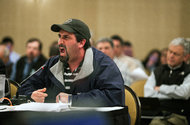 ht and getting darker when it comes to how many cod there are,” he said. “There isn’t enough cod for people to make a decent living.” But opponents said the limits would not help save the industry.
ht and getting darker when it comes to how many cod there are,” he said. “There isn’t enough cod for people to make a decent living.” But opponents said the limits would not help save the industry.
“Right now what we’ve got is a plan that guarantees the fishermen’s extinction and does nothing to ameliorate it,” David Goethel, a New Hampshire-based fisherman and biologist, said as he cast his vote against the plan.
Fishermen were furious with the result.“I’m leaving here in a coffin,” said Carlos Rafael, who owns a commercial fishing business in New Bedford, Mass. “With all these cuts, I won’t be able to keep half of my fleet working. I’ll have to cut down from 20 groundfish boats to maybe 5or 6.” Read more
Keep the Fishing Ban in New England – CALLUM ROBERTS, YORK, England
![]() Where were the regulators through all of this? Always one step behind and perennially ineffective. Federal law delegated to the New England Fishery Management Council authority to manage the fishery from 3 miles to 200 miles off the coast, but the council didn’t see its job as speaking up for fish. This body was dominated by fishing interests, so when faced with a choice of fishing now or cutting back the catch to assure the fishery’s future, the council’s decisions often favored the short term. With such decisions, collapse of the fishery was inevitable. When it happened in the late 1980s, it was brutal and swift. By the early 1990s, all agreed that something had to be done. The council reinvented its approach to fishery management.Read more
Where were the regulators through all of this? Always one step behind and perennially ineffective. Federal law delegated to the New England Fishery Management Council authority to manage the fishery from 3 miles to 200 miles off the coast, but the council didn’t see its job as speaking up for fish. This body was dominated by fishing interests, so when faced with a choice of fishing now or cutting back the catch to assure the fishery’s future, the council’s decisions often favored the short term. With such decisions, collapse of the fishery was inevitable. When it happened in the late 1980s, it was brutal and swift. By the early 1990s, all agreed that something had to be done. The council reinvented its approach to fishery management.Read more

































